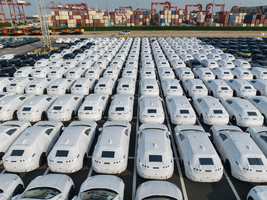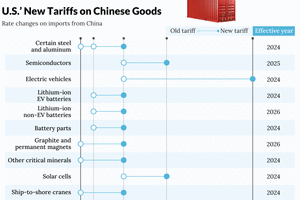Caixin Explains: How the EU’s New Tariff Hikes Will Affect China-Made EVs
Listen to the full version
The European Union has decided to provisionally impose extra tariffs of up to 38.1% on battery-electric vehicles shipped from China as part of an ongoing investigation finding that state subsidies are enabling Chinese electric-car makers to undercut their EU rivals, despite divisions in Europe over the issue.
The bloc formally notified carmakers including BYD Co. Ltd., Geely Automobile Holdings Ltd. and SAIC Motor Corp. Ltd. of the new duties to be implemented from July 4, the European Commission said in a statement Wednesday.

Download our app to receive breaking news alerts and read the news on the go.
Get our weekly free Must-Read newsletter.
- DIGEST HUB
- The EU is imposing extra tariffs up to 38.1% on Chinese electric vehicles, affecting manufacturers like BYD, Geely, and SAIC starting July 4.
- Nearly 20% of EVs sold in the EU last year were from China, with expected drops in Chinese EV imports due to tariffs.
- Some Chinese companies plan to localize production in Europe; BMW and others have criticized the tariffs, fearing escalating trade tensions.
The European Union (EU) has provisionally decided to impose additional tariffs of up to 38.1% on battery-electric vehicles imported from China. This decision stems from an ongoing investigation into state subsidies that are allegedly enabling Chinese electric vehicle (EV) manufacturers to sell their products at lower prices than their European competitors, despite differing opinions across Europe on the matter[para. 1].
The new tariff measures, which will be effective from July 4, have been formally communicated to car manufacturers such as BYD Co. Ltd., Geely Automobile Holdings Ltd., and SAIC Motor Corp. Ltd. by the European Commission[para. 2]. The specific tariff rates will depend on each company's level of cooperation with the investigation. SAIC will face the highest tariff increase of 38.1%, in addition to the existing 10%, due to its status as a state-owned company. Geely will see a 20% increment, and BYD will face an additional 17.4%[para. 3].
For EV manufacturers that cooperated but were not part of the three-company sample, a weighted average duty of 21% will apply. Uncooperative companies will incur the full 38.1% tariff. Notably, European brands like Mercedes-Benz, BMW, and Renault, which export EVs assembled in China, will also be subjected to these additional tariffs[para. 5].
In response to this decision, China’s Ministry of Commerce issued a statement accusing the EU of ignoring facts, World Trade Organization (WTO) rules, and strong objections from China, as well as appeals from several EU member states' governments and industries. The ministry vowed to take necessary measures to safeguard the rights and interests of Chinese companies[para. 6].
Tesla Inc., an American EV giant that imports Model 3 sedans from Shanghai to the EU, has requested a lower tariff rate, arguing that it has benefited from less extensive state support compared to Chinese companies[para. 7].
The EU initiated an anti-subsidies investigation into Chinese electric car imports in October, potentially leading to countervailing duties within nine months. This probe began as European automakers were being significantly challenged by cheaper Chinese imports, with the European Commission citing that China-made EVs were generally 20% cheaper than European models[para. 9][para. 10].
As a consequence of the additional 21% duty, it’s anticipated that the number of Chinese EVs exported to the EU will drop by about 30% in the short term, according to Liu Yan, a senior engineer at the China Automotive Technology and Research Center[para. 11]. The Kiel Institute for the World Economy projected a 25% reduction in Chinese EV imports, equating to approximately 125,000 units or nearly $4 billion[para. 12].
The European Union Chamber of Commerce in China emphasized the need for proportionate, transparent, and WTO-consistent tariffs and noted that the anti-subsidies probe is still in its provisional stage, with definitive measures to be confirmed by the end of the year[para. 14].
In response to these measures, Chinese companies are investing in European car assembly to mitigate risk. For example, BYD signed a preliminary agreement to build its first European EV factory in Hungary, while Chery Automobile Co. Ltd. acquired a manufacturing facility in Barcelona[para. 17][para. 18]. SAIC also plans to build its first EV factory in Europe despite voicing concerns about the EU's decision, which it claims contradicts market principles and could harm global auto industry stability[para. 20].
BMW's CEO, Oliver Zipse, criticized the EU’s decision, calling it unfavorable for international competition and warning about a potential cascade of retaliatory tariffs[para. 22][para. 23].
If the increased tariffs fail to significantly impact Chinese exports, the European Commission may consider alternative measures, such as tightening cybersecurity requirements or adjusting subsidy regulations to restrict Chinese EVs further[para. 28].
In summary, while this provisional tariff imposition is seen as the initial tool in the EU’s regulatory approach, further actions may follow to curb the influx of Chinese electric cars into the European market[para. 30].
- BYD Co. Ltd.
- BYD Co. Ltd. will face an additional 17.4% tariff on its battery-electric vehicles shipped from China to the EU, as part of the EU's new countervailing duties. BYD is also increasing its investment in European car assembly to mitigate the impact of these tariffs and signed a preliminary land purchase deal in February to build its first European electric passenger car factory in Hungary, expected to be operational within three years.
- Geely Automobile Holdings Ltd.
- Geely Automobile Holdings Ltd. is a Chinese carmaker facing an additional 20% tariff on electric vehicles (EVs) exported to the EU due to the European Union's ongoing anti-subsidies probe. The company, which makes Volvo and Polestar cars, is part of the investigation into state subsidies allegedly allowing Chinese EV manufacturers to undercut European rivals.
- SAIC Motor Corp. Ltd.
- SAIC Motor Corp. Ltd. is a state-owned Chinese carmaker that owns the British brand MG. It faces the highest new tariffs imposed by the EU at 38.1% on top of the existing 10%. SAIC is also planning to build its first EV factory in Europe and has expressed deep disappointment with the EU’s decision, arguing it may adversely impact global auto industry stability and Sino-Europe trade.
- Chery Automobile Co. Ltd.
- Chery Automobile Co. Ltd. announced its acquisition of a vehicle manufacturing facility in Barcelona, previously owned by Japan’s Nissan Motor Co. Ltd., which was shut down in 2021. This move signifies Chery's plans to localize production in Spain as part of its European expansion.
- Tesla Inc.
- Tesla Inc., which imports Model 3 sedans into the EU from its Shanghai plant, has requested the European Union to subject its vehicles to a lower tariff rate. Tesla argues that it has benefited from less substantial state support compared to other manufacturers.
- By July 2023:
- SAIC unveiled a plan to build its first EV factory in Europe.
- October 2023:
- The EU formally began the anti-subsidies probe into imported Chinese electric cars.
- By February 2024:
- BYD signed a preliminary land purchase deal to build its first European electric passenger car factory in Hungary.
- By March 2024:
- Nearly 20%, or 300,000 units, of EVs sold in the EU last year were made in China according to the European Federation for Transport and Environment.
- By April 2024:
- Rhodium Group reported that the European Commission may explore alternative measures if tariff hikes fail to impact Chinese exporters.
- Late May 2024:
- The Kiel Institute for the World Economy published a report on the impact of a 20% tariff on bilateral trade and production in Europe.
- June 12, 2024:
- BMW CEO Oliver Zipse called the EU's decision on extra tariffs 'the wrong way to go.'
- June 13, 2024:
- A report by Liu Yan from the China Automotive Technology and Research Center predicted a decrease in Chinese EV exports to the EU.
- PODCAST
- MOST POPULAR







 Sign in with Google
Sign in with Google
 Sign in with Facebook
Sign in with Facebook
 Sign in with 财新
Sign in with 财新